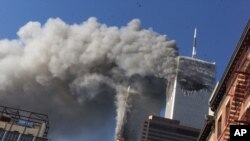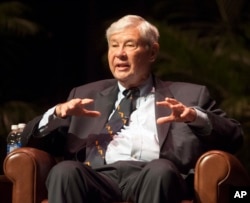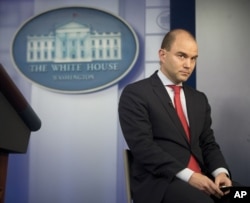Nearly 15 years after terrorists hijacked four passenger jets and crashed them into the World Trade Center in New York, the Pentagon outside Washington, D.C., and a farm field in Pennsylvania, 28 pages detailing foreign support for the attackers could soon be made public.
Only a select group of U.S. officials have read the highly classified document, which has been locked in a secure area of the U.S. Capitol building since a joint congressional committee crafted it in 2002.
Bills in both the Senate and House of Representatives and people who helped write it are calling for its release.
Despite its classified status, those familiar with the chapter have made enough allusions to its connections with Saudi Arabia for people to wonder about what exact link the document may suggest.
Former Senator Bob Graham, who was a part of the joint committee, said Sunday during an interview on NBC's Meet The Press the pages should be released to end debate over what they contain and let the American public make up its own mind about the contents.
When asked if the release would have a high-level negative impact, Graham said yes.
Saudi citizens
He said whether the 19 hijackers, 15 of whom were Saudi citizens, had any outside help is the most important outstanding question related to the September 11, 2001, attacks that killed nearly 3,000 people.
"I think it's implausible to think that people who couldn't speak English, had never been in the United States before, as a group were not well-educated, could have done that," he said. "So who was the most likely entity to have provided them that support? And I think that all of the evidence points to Saudi Arabia."
Former President George W. Bush ordered the 28 pages to be classified and not included in the 828-page congressional report that was released to the public.
His successor, Barack Obama, has ordered his intelligence team to review the chapter, and Graham said he hopes the text will be made available when a decision is made by June.
Last week, Obama's Deputy National Security Advisor Ben Rhodes said he expects "there will be some degree of declassification that provides more information."
But Rhodes did not speak to the timing and cautioned that the work of the joint congressional commission and the subsequent 9/11 Commission have given a "definitive statement" determining that Saudi Arabia did not have an intent to support al-Qaida.
Obama visit
U.S.-Saudi relations have come under heightened focus with Obama's visit there last week and his public criticism that the kingdom is not doing enough to address terrorism in its own region.
Another member of the congressional commission, former Representative Tim Roemer, said last week that the group "did not exonerate the Saudis," and that the pages should be declassified.
"The Saudis won't relish the renewed spotlight, and it could strain relations with a valued ally with whom we have sometimes experienced a turbulent partnership," Roemer wrote in RealClearPolitics. "But we have more to fear from secrecy and conspiracy theories than pursuing transparency and truth, and the 9/11 families deserve to have the fullest possible record available from past investigations."
The 9/11 Commission Report, which was published in 2004, calls Saudi Arabia a "problematic ally in combating Islamic extremism."
In addition to citing a cooperation failure among U.S. security agencies, the report notes a failure in U.S.-Saudi cooperation in sharing intelligence information or disrupting al-Qaida's finances.
9/11 hijackers
It also offers varied explanations as to why so many of the 9/11 hijackers were Saudis.
The report said Ramzi Binalshibh, a Guantanamo Bay detainee described as the "coordinator" of the attacks, explained the choice of the hijackers as a deliberate message to the Saudi government about its relationship with the United States.
But the next paragraph cites 9/11 "mastermind" Khalid Shaikh Mohammed denying that theory. Instead, Mohammed says the number of Saudis involved in the attacks was a reflection of the high percentage of recruits in al-Qaida training camps who came from Saudi Arabia.






